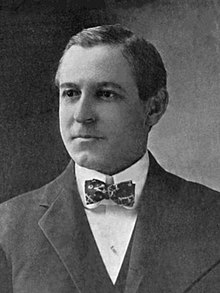Charles Winston Thompson
| Charles Winston Thompson | |
|---|---|
 |
|
| Member of the U.S. House of Representatives from Alabama's 5th district |
|
|
In office March 4, 1901 – March 20, 1904 |
|
| Preceded by | Willis Brewer |
| Succeeded by | James Thomas Heflin |
| Member of the Alabama Senate | |
|
In office 1898-1900 |
|
| Personal details | |
| Born |
December 30, 1860 Tuskegee, Alabama |
| Died | March 20, 1904 (aged 43) Washington, D.C. |
| Nationality | American |
| Political party | Democratic |
| Spouse(s) | Estelle Alley |
| Religion | Methodist |
Charles Winston Thompson (December 30, 1860 – March 20, 1904) was an American banker and politician. He served as a Member of the U.S. House of Representatives representing Alabama's 5th district from 1901 till his death. He was a Democrat.
Thompson was born on December 30, 1860 near Tuskegee, Alabama to William P. and Mary W. (Jordon) Thompson. His father was a confederate soldier who went on to become mayor of Tuskegee and sheriff of Macon County. He was educated in public schools and graduated from Tuskegee's Park High School in 1878. From there Thompson attended Bryant & Stratton Business College. Thompson married Estelle Alley on April 20, 1880. The couple had two children, Ernest W. and Charles Winston Jr., before her death on March 19, 1894. From 1886 till 1890, Thompson served as Superintendent of education for Macon County.
Upon completion of his education, Thompson went to work at his father's mercantile business. He remained there until his father's death in 1891 when he sold the business. Thompson used the proceeds of the sale to open the Bank of Tuskegee, to which he was elected President. In 1894 Thompson helped create the Farmer's and Alliance Warehouse Company. Two years later, Governor Joseph F. Johnston appointed Thompson to his staff as a lieutenant colonel. He also became a Trustee to both Notasulga's Methodist District High School and the Girl's Industrial School of Alabama.
In 1898, Thompson ran unopposed for the Alabama Senate. There he represent the 26th district for two years during which time he helped secure a US$100,000 appropriation for the Girl's Industrial School, the largest such appropriation ever made by Alabama at the time.
...
Wikipedia
